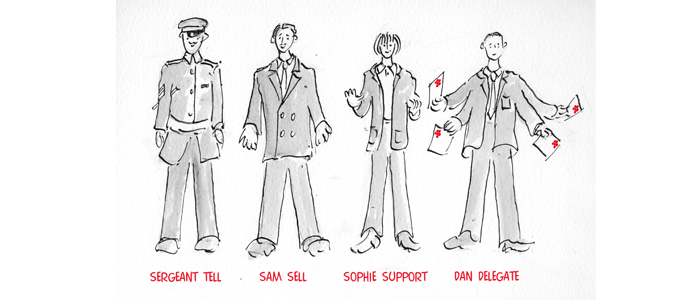What’s your concept of being a leader? One of the gang? Aloof and dictatorial? Stand back and let them get on with it? We give you pointers on how to develop your own effective leadership style.
We often find ourselves modelling our leadership on past experiences of leadership – regardless of whether these models were effective or not.
Let’s take David as an example. He was a successful sales representative with a large multinational company. He believed in the product and it was this passion that made his highly successful.
So everyone expected him to be a great leader when he was promoted to regional sales manager; However, David adopted a style of leadership at best described as remote. He spent hours working behind a closed door on paperwork and largely ignored his team, only emerging when something went wrong, to deliver reprimands and orders. Within six months his very mature and experienced team was in uproar, demotivated and angry. Results had plummeted.
During coaching sessions, we discovered that David was used to ‘Attila the Hun’ style leadership – so this is what he thought was expected of him.
Instead we worked on developing a Partnership style… this old story illustrates the concept well:
A man who wanted to decide whether to go to Heaven or Hell when he died. So he journeyed to the gates of Hell and asked for a tour. When he entered he was confronted by an amazing scene: a table, groaning with delicious food and drink, looking incredibly enticing. “Well”, he thought, “this doesn’t look bad. I could handle a few millennia here”. But the people surrounding the table were thin and gaunt, and he realised that though they had a spoon, the spoon was so long, and fastened to their hand in such a way, as to make it impossible for them to eat. So they were doomed for all time to be tortured by the sight and smell of a delicious banquet they were unable to enjoy.
So the man set off on his journey again. Arriving at the Pearly Gates, he requested a tour of Heaven – and was greeted by exactly the same sight: the groaning table, the delicious scents and sights – and the people with exactly the same long spoons and, this time, blissful, contented faces.
What was the difference? After a short period of thought, David got it: the people in Heaven were feeding each other.
This is the essence of partnership at work – you come to work with your focus on the others around you: how can you make them successful? How do you ensure that they deliver what’s needed first time, with the minimum of fuss, conflict and hassle? Not because it will make your life easier (though it will) but because it’s one of your values, the right thing to do.
And what effect did it have on David? Within weeks, the team were happy and motivated again, communicating well with him and results were back on the up.
So how can you develop your own effective leadership style within your organisation?
- Communication skills are important but the key to getting others on your side and sparking their enthusiasm and motivation is your attitude to them. So explore honestly your attitude towards leading others; are you motivated by ego and self-interest, or by a genuine wish to lead a healthy organisation in which people thrive?
- Imagine what it’s like working in a team where partnership forms one of the core values, and where everybody behaves accordingly. You can come to work knowing that whatever you do, your colleagues will have your back. And they know too that they are safe; no one is waiting to finger-point when they make a mistake. To do this you need to set up this as the favoured behaviour, supported by reward systems based not on individuals, but on teams. Consciously guide your organisation this way, involve your team in inventing creative ways to work together and build reward and remuneration structures that support working in partnership, not against each other.
It’s your organisation, and you’re its leader – what would you like it to be like?

